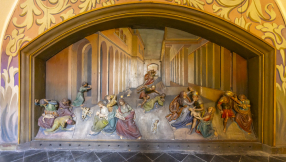
Not all stories are happy stories. Some are unsettling. Every once in a while, we stumble across a story that shatters our sensibilities and shakes our sense of how the world works.
Mark 5:1-20 is one such story.
For us "enlightened" twenty-first century readers, the segment where two thousand pigs hurtle off a cliff and drown sends our consciences into convulsions. (Couldn't they have just gone to the market or stayed at home instead?)
For those who saw the story first-hand or read Mark's Gospel shortly afterwards, this pig thing wasn't as much of an issue. The unsettling section for them is Jesus healing a man from demonic power and restoring him to a healthy consciousness.
The truth is, it's hard to overstate how remarkable this exorcism is.
Jesus has cast out demons before. It's a principle part of his gospel-preaching profession, and he begins to get quite a name for it – even amongst the demons themselves. 'Whenever the unclean spirits saw [Jesus], they fell down before him and shouted, "You are the Son of God!"' (Mark 3:11).
It's all part of a cosmic battle between Jesus and Satan, which began in the wilderness in 1:13, and Jesus has been kicking Satan's butt ever since.
Not everyone understood this, though.
When Israel's leading scholars declared that Jesus was a double-agent, driving out demons 'by the ruler of demons' (3:22), Jesus admitted that Satan does indeed have a kingdom – and then exposed the absurdity that Jesus himself could ever be working for it.
Now, here in Mark 5:1-20, Jesus crosses a lake and lands right in the lap of one of the strongest soldiers in Satan's kingdom.
Legion.
A demon. (Or, demons – he/they went by multiple pronouns.)
He is called Legion because 'we are many.' About six thousand, to be exact (the approximate size of a Roman army legion at the time).
But Legion is not formidable because of his size only. Legion is formidable also because of his strength and savagery – and Mark makes quite a show out of letting us know.
Firstly, we are alerted to the triple-uncleanness of the man possessed by Legion: (1) he lives the 'the other side of the lake' (oh dear) – in Gentile land; (2) he's possessed by an unclean spirit; and (3) and he lives among the dead in a cave-tomb type thing.
Next up is another triplet, this time of "not's/no's." If we translate verse three literally, we read that "and not even with a chain no longer no-one was able to bind him." That's pretty awkward, so it's a good thing we don't read everything literally. But hopefully you get the point: the man is strong, too strong to be contained.
In case we didn't get this memo, Mark reinforces it with a chiasmus (which is a literary technique of reverse-order repetition):
A – 'no-one could restrain him any more...'
B – 'he had often been restrained with shackles'
C – 'and chains,'
C1– 'but the chains he wrenched apart,'
B1 – 'and the shackles he broke in pieces;'
A1 – 'and no-one had the strength to subdue him.'
That's a lot of shackles and chains and restraining inabilities.
Maybe Mark forgot what he wrote and repeated himself. Perhaps he did it on purpose. Either way, what we get is more reading (yay) and a clear picture of a ridiculously ripped man who could not be tamed – not even with chains.
As if that wasn't enough, Mark bombards us one final time with the man's depravity by describing how he would howl on top of mountains and cut himself with stones. He is a man ruined by evil and its abusive urges.
Then he meets Jesus.
Legion recognises that Jesus is 'Son of the Most High God,' and he knows he can't win. All he can do is negotiate his terms of surrender.
And negotiate he does, asking 'by God' that Jesus would not torture him – another way of saying, "If you're not nice to me, then your dad will be mad."
But Legion clearly skipped Sunday School, because this is not how it works.
He resorts to begging to stay in the area (strange), even if it means moving into some pigs on the hillside (even stranger). Jesus grants the six thousand spirits permission to enter the two thousand pigs, and then things start to go downhill – literally: the pigs surge off a cliff and drown in the sea.
The pig herders run into town to report what happened. The townspeople rush out to investigate. They follow the clues back to Jesus.
What they see terrifies them.
There is the man – sitting, clothed, and in his right mind. He is so sane that Jesus sends him home to the Ten Cities as the first missionary to the Gentiles.
We might have expected the crowd to be happy with this – hasn't Jesus just liberated them from the local madman?
Sadly, they are not happy at all. They are afraid.
They want nothing to do with a man who has such authority over evil. It unsettles them. But it doesn't seem to unsettle us.
It probably would, if we weren't already so pre-occupied with those dead pigs.
How could Jesus do that to them? Sure, they are ritually 'unclean' animals (Leviticus 11:7), but Jesus is so lovely and kind – why would he kill them? #NotMyJesus - and that's right. It isn't your Jesus. It's not anyone's Jesus: Jesus does not kill these pigs. Mark never even comes close to suggesting that Jesus did it. All that Mark cares to show us is that Jesus is effortlessly stronger than the strongest of Satan's soldiers.
It is Legion, the demons, who drive the pigs into the sea.
However even then, it doesn't seem like it was intentional, given that the demons beg not to be tortured or sent out of the area. If they planned on sticking around, why would they blow their chance by charging off a cliff?
It seems instead that the self-destructive impulse of evil is too much for the pigs to handle.
Legion, as with Satan, and as with every evil force, was obsessed with the demolition of God's good creation. The man, led by Legion, lived in the local tombs and came as close to death without dying as a human could get. The pigs, by contrast, don't stand a chance. They die – and take Legion with them.
Two thousand demon-possessed pigs drowning at sea is not a pretty picture. Nobody (I hope) will feel inspired to immortalise this scene on the ceiling of their fifteenth-century chapel.
This, though, is the nature of evil. It is chaotic. It's messy. It throttles human life and here hits full throttle on a herd of pigs as they head down a hill.
And we have to live with it, even with Jesus around.
Mark 5:1-20 should be a happy story, given that Jesus deposes a demon and saves a man's life. But it's not. It's unsettling (and not only because pigs die). It exposes the ugly reality of evil – especially as Jesus expels it.
Our times are just as evil now as they were then. Evil is just as ugly now as it was then. And Jesus is just as superior to evil now as he always will be. I can't think of a more uncomfortably comforting reason to worship him.













